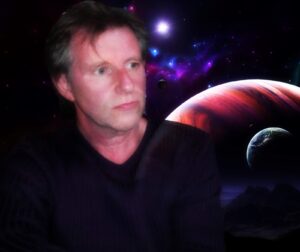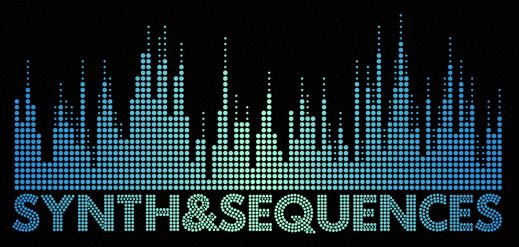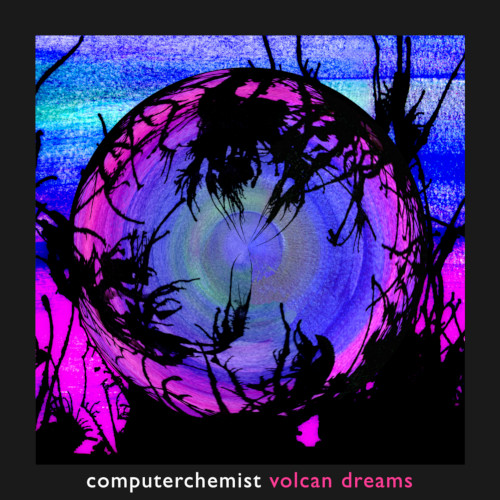Click HERE to go straight to reviews
For this, his eighth solo album, Dave Pearson (computerchemist) has gone back to basics and produced 5 new tracks completely in the analogue domain using only Korg Volca boxes. With guest appearances from Chris Gill (Band of Rain) and Zsolt Galántai (MAYA, Rusty Gold, Ossian) this album is sure to hit the sweet spot for analogue fans of ‘old school’ synthesizer music.
Bruce Gall’s show ‘Atmospheres’ on oneworldmusic.co.uk exclusively premiered the album, together with an interview with Dave, in two parts between March 10th and March 17th 2019.
Label: Terrainflight TF010
Release Date: 10th March, 2019
Track listing:
- volcan plain 12:03
- through the volcan forest at dusk 10:08
- volcan sea 15:31
- valley of modulation 06:45
- subsonic volcan flight 14:55
dave pearson: volca modules, keyboards, sequencer programming
zsolt galántai: drums on ‘valley of modulation’
chris gill: guitars on ‘volcan plain’
artwork: angiewoman
all composing, mixing and mastering in the digital domain at terrainflight hungary
between jan 2019 and feb 2019
chris recorded his guitar at hollow hill studio, dorset, england in jan 2019
zsolt had his drum performance recorded by dave in a damp basement in budapest in 2011
written & produced ©(p) 2019 by dave pearson
contacts:
terrainflight: info@terrainflight.com
dave: www.computerchemist.com
zsolt: www.soundcloud.com/zsolthy65
chris: www.bandofrain.com
no virtual synthesizers or virtual effects were used on this record.
Reviews
Bruce Gall – Atmospheres

Music has a tendency to take the listener back to a certain period of their lives and Computerchemist’s new album, “Volcan Dreams”, takes me personally back to 2009 and the album “Aqual Measure”, but this is all new material from Dave Pearson and recorded over a few weeks in early 2019, which just happens to be 10 years after “Aqual Measure!”
However, Dave says this was composed and performed in a relatively short space of time and in one of those rare fertile artistic periods (for some of us at least, meaning myself) where the music comes to you from some unknown dimension. How many times have you heard a musician say they had no idea where the ideas came from but were compelled to play it!
Dave’s love of “classic” EM and the analogue age is evident in the sounds on “Volcan Dreams” so for any EM fans who have not managed to progress past the 70’s, for those who have but still enjoy a little nostalgia, and for those who enjoy krautrock, then this is certainly worth your time.
Track lengths are between 10-15 minutes so there’s plenty of time for the music to slowly develop and take on a life of its own with hypnotic, rhythmic sequences, not only that, but with guest appearances on real drums by Zsolt Galántai (Valley of Modulation) and Chris Gill on guitar (Volcan Plain).
I’m listening to this music for the first time as I type and already I know I like it. You know that feeling when you hear a track and within two seconds you know you’ll like it? Maybe not, but that’s the impression I am getting while listening to this album. Of course, there is a Tangerine Dream feel but isn’t every album released with the slightest hint of that 70’s sound related to TD and Dave openly admits he is influenced by the dream? But if you can harness that sound and feel and add your own personality to it, which I believe Dave has to great effect, then you are on to a winner.
I’m always intrigued by musicians who produce improvised music, I know this is not strictly improvised, but composed and played over a short period and I weigh up whether it is sometimes best to go by your instinct, whether it is in life or in music-making, an inspirational moment where you play what “feels” right at that time can be preferable to taking weeks or months to get it “just right” where everything is perfect and, sometimes, that feeling that you are doing the right thing also applies to life decisions. Dave said he set himself a target with a certain sound in mind and in my opinion has produced something most EM lovers will be interested in, so if you are reading this I assume you are an EM fan so I will also assume, no, almost guarantee you will enjoy this. I don’t try to describe what each track sounds like, as you will listen yourself and will interpret the music in your own way so why should I tell you how it sounds? I’m just a fan like you!
– Bruce Gall, Atmospheres, oneworldmusic.co.uk
José Luis Martinez Arilla – Descubre LA CAJA DE PANDORA (ES)

Since 2006, the well known writer and critic José Luis Martínez Arilla from Zaragoza, Spain has been publishing his well respected Spanish language progressive music review blogsite “Descubre la Caja de Pandora” (“Discovering Pandora’s Box”
En un excelente ejercicio de devolver la grandeza desde un punto de vista actual a la denominada Escuela Berlinesa, o rock cósmico o espacial con enlaces directos al jazz, Dave Pearson se ha armado con sus módulos analógicos Volca y desde Hungría, su base de operaciones, ha lanzado un trabajo a la antigua usanza.
Un trabajo hecho con mucho sentimiento y más dedicación, sin la utilización de programas digitales, con el único, y no es poco, objetivo de regalarnos una música plena de sentimiento forjada desde los elementos armónicos y las melodías: acordes y acompañamientos que son el auténtico armazón de una música hecha con el corazón, el alma y mucho, mucho esfuerzo. El resultado, en el que han colaborado en una u otra medida, tanto Zsolt Galantai (batería en uno de los temas) como Chris Gill (guitarrista de Band of Rain en otro), es cálido, elegante y sublime. Temas que avanzan implacablemente por el universo Computerchemist y que nos relatan la existencia ficticia de un universo que el británico magiar recorre, como si de un viaje se tratara, desde su inicio hasta su excelente y decisivo capítulo final. Un estímulo continuo para los sentidos en el que el autor crea y visualiza un inexplorado mundo llamado Volcan (en alusión directa a sus mini sintetizadores Korg Vulca, totalmente analógicos), que sirve como excusa perfecta para plasmar las impresiones que el misterioso lugar imprime en un hipotético visitante por primera vez.
Música de otro planeta, tal y como sugiere Dave, en el que se visualizan imaginariamente exuberantes selvas tropicales y vastos océanos, conformando un trabajo que hay que ir escuchando y saboreando en sus distintos capítulos-experiencias que concluyen, como en un círculo perfecto, en una experiencia sensitiva sugerida por la exploración de distintos paisajes musicales. El trabajo, artesano en estos tiempos que corren, se grabó sin sintetizadores virtuales de ninguna clase ni efectos generados artificialmente, utilizando, en tiempo real, únicamente un ordenador como sistema de grabación. Este primer trabajo analógico tras veinte años de tecnología ha supuesto una gran inversión económica para el músico, pero el resultado ha sido totalmente agradecido y generoso. Si te volaron la cabeza aquellos que en buena parte de los setenta te hicieron vislumbrar un universo de sensaciones, tú sabes de quiénes hablo, sin duda que este Volcan Dreams es una más que una agradable y necesaria sorpresa para tus sentidos. No tengas miedo, compra un billete para el siguiente vuelo a Volcan. Me lo agradecerás
— José Luis Martinez Arilla, Descubre LA CAJA DE PANDORA, 27 March 2019.
descubrelacajadepandora.blogspot.com
John Shanahan – Hypnagogue

For many EM fans, there’s nothing quite like the big, robust taste of nostalgia. Spring-loaded, planet-crushing bass keyboard notes, frenetic laser arrays of perfectly layered sequencer lines, and arena-ready, rocket-fueled guitar licks become the high-volume stuff of dreams—and we all know whence those dreams come. For those who worship at the altar of St. Schulze, a new offering has arrived in Computerchemist’s latest release, “Volcan Dreams”, Dave Pearson heads back to his roots, recrafting textbook Berlin School voyages full of all the familiar delights. Armed with just Korga Volca modules and analog effects, and aided by Chris Gill on guitar and frequent collaborator Zsolt Galantai on drums, Pearson delivers energy-packed potency track after track. His love of the style shines through every note. It’s fun, it’s fast, and you’re going to blow out speakers with it because you absolutely will be turning this up.
— John Shanahan, Hypnagogue
Jerry Kranitz – Author, Aural Innovations

Cassette Culture: Homemade Music and the Creative Spirit in the Pre-Internet Age to be published later this year.
Computerchemist is a solo project from Dave Pearson, an English musician residing in Hungary. Volcan Dreams is his latest and, armed with Korg volca modules, keyboards, and sequencer programming, creates a set of Berlin School meets sci-fi soundtrack analogue delights.
‘Volcan Plain’ opens the set in Klaus Schulze mode, though Pearson adds an underlying layer of sinister sci-fi soundtrack sear. The music marches along at a slow but commanding pace, creating a cool blend of watch-your-back tension and hypnotic mind massage. As a bonus, Band Of Rain’s Chris Gill guests on guitar, adding periodic solo guitar runs to the overall deep space vibe.
Pearson picks up the pace on ‘Through The Volcan Forest At Dusk’, which zips along at a classic Tangerine Dreamy syncopated stride, while melodic synths create yet another spaced out soundtrack feel. I especially like the dual classic space-prog and banshee wailing synth melodies on this track.
‘Volcan Sea’ is similar though even more energetic, with a beautifully catchy melody, sounding like the 15 minute full version of the opening credits theme to some sci-fi TV series. I love how the atmosphere and theme gradually evolve on this space-prog rocking slab of cosmic electronica.
‘Valley Of Modulation’ welcomes Zsolt Galántai on drums, who collaborated with Pearson on the previous Computerchemist albums, 2013’s Signatures 1 & 2.
Finally, ‘Subsonic Volcan Flight’ closes the set and is a bit different, injecting a high energy Neue Deutsche Welle meets dance floor rave electronica groove into Pearson’s brand of space exploration.
In summary, I’m really diggin’ the Berlin School meets sci-fi flick soundtrack theme that characterizes most of this set. Klaus Schulze meets Delia Derbyshire meets Goblin meets John Carpenter… If that catches your attention then check it out.
— Jerry Kranitz, Cassette Culture and Aural Innovations, January 2019
Alfred Arnold – EMPulsiv.de (DE)

Vor ein paar Jahren hat David Pearson, der unter dem Namen “Computerchemist” veröffentlicht, schon einmal “Music For Earthquakes” eingespielt. Jetzt ist er mit “Volcan Dreams” zur Geologie zurückgekehrt. Wer jetzt angesichts des Titels einen bombastischen musikalischen Ausbruch erwartet, liegt nicht ganz richtig: Der Vulkan schläft über weite Teile der Zeit, und das Album bietet einen abwechslungsreichen Mix verschiedener Stimmungen, um in dem letzten der fünf Tracks einen passenden Schlußpunkt zu setzen. Wie die Anzahl der Titel – un die daraus resultierenden Längen – erahnen lassen, macht der Computerchemiker keinen Hehl daraus, dass seine musikalischen Wurzeln bis in die 70er-Jahre zurückreichen. Erfreulich ist, dass er bei seinen Mixturen immer rechtzeitig einen Absprung findet, bevor sie langweilig werden könnten. “Volcan Dreams” ist für die Fans von Berliner Schule und Sequenzen, aber nicht nur für die, auf jeden Fall einen Mitflug wert.
— Alfred Arnold, EMPulsiv.de, 11 March 2019
Sylvain Lupari – Synth&Sequences

WoW! J’ai dévoré cet album de Computerchemist, un projet de Dave Pearson qui fait un foudroyant retour avec Volcan Dreams. Un album de pur délices pour amateurs de Berlin School rétro avec de gros solos de synthé…
Computerchemist is the project of the English musician Dave Pearson. Active musically since 2007 with a highly acclaimed debut album in Atmospheric. The synthesist who lives now in Hungary, is making a comeback with his 7th album; VOLCAN DREAMS. And what do volcanoes dream of? Well, of Tangerine Dream‘s music! On structures of rather catchy rhythms, Computerchemist forges very Berlin School approaches in the programming of the sequencer and has really nothing more to learn of Chris Franke. Moving between minimalist art and a kind of psychotrobic trance, the rhythms serve more the cause of synth harmonies and solos than its opposite, creating the perfect illusion of the 70’s with a tone very close to that time. And Dave Pearson insists, there are no virtual synths nor virtual effects on this album. Using the Volca synth modules, the English musician weaves solos that are sometimes even staggering, and always very attractive, which constantly swirl with varying colors and intensity levels but with a touch that gives chills. It’s therefore with great pleasure that I share with you my comments on VOLCAN DREAMS, an album that has exceeded my level of expectation. Both in terms of compositions, music and of its excellent tone for an album available mainly in download on Computerchemist’s Bandcamp platform. A physical CD can also be bought.
What comes out of my Totem speakers are juicy and resonant chords. Just behind, we hear a series of sequences which walks stealthily. A march that becomes more present, more accentuated with the arrival of electronic percussions. So, it’s a kind of slightly hobble up-tempo that “Volcan Plain” extends its musicality all around my listening room. I insist on this point, not by snobbery, but to make it clear that in a download version the sound of VOLCAN DREAMS bursts from everywhere. The synth delivers beautiful lines with a hint of Chinese weeping violin while the two tones of the sequencer’s lines clash while clinging to percussions. This steady structure and a minimalist touch welcome these mists that add a more mystical decor to a music whose perfumes are quite tangible. The synth pitches good effects and throws good solos that turn in turn, by turns with keyboard chords which leave their harmonic imprints into our ears. Chris Gill completes the work with a bright and vivid guitar whose solos add a progressive touch to the music. Take the spectral harmonies of Phaedra and stick them to a brisk and spasmodic pace, you get the main ingredients of “Through the Volcan Forest at Dusk“. Two lines of sequences structure a lively flow, one of which flutters sharply, which is helped by a sneaky bass line and clatters of percussions, giving a semblance of wings to this rather catchy electronic rhythm. This structure is interrupted in some places with sequences that flutter in solo to give the synth the space it needs to emit its short evasive melodies. The solos abound on this title, and some are simply flabbergasting, with random tracings and changing tones. The essence of the 70’s is well reproduced in this title, both at the level of rhythm level, of the ambiences and the harmonies of the synth.
With a level of rhythm where we stamp of feet and we roll of the neck, “Volcan Sea” fully explores the meaning of its title. Initially, the rhythm is built on stationary sequences whose fluttering and flow converge towards a dark and threatening sound mass. Spray of sounds emerge by the form of synth solos and discret keyboard riffs. The tone of the synth is very sharp with piercing solos which intertwine as the rhythmic intensity is eating up the time in order to reach a symbiosis of intensity around the 5 minutes with the arrival of percussions. The spasmodic rhythm is still hiccupping as the synth ignites its progressive flame by spitting fire solos that remind me of the good days of Manfred Mann’s Earth Band with the album Solar Fire. Intense and superb in its drifts and its random axes, it’s a very good title which left its imprints on my walls. “Valley of Modulation” still shows Computerchemist’s skill for weaving morphic solos. On a slow pace, like a cosmic down-tempo, Dave Pearson conceives his solos which get unite to a melodious approach. The drum of Zsolt Galántai adds a bit of astral sensuality with a good presence that accentuates the heaviness of the rhythm. Gradually, this beat is out of steam and the harmonic solos sail alone towards a finale rounded of resonances which swallow everything, to disappear suddenly and thus destabilizing a listening that had become hypnotic. “Subsonic Volcan Flight” ends VOLCAN DREAMS with a big Techno & Trance! Bass sequences that make boom-boom-boom, slamming of percussions and hands and a decor that flees the senses at 100 per hour, the rhythm really leaves the territories Berlin School with a Vanderson approach, but heavier … and even faster. Jean-Michel Jarre I would say, during his last Electronica tour. In addition to jerky orchestral layers and psychotronic effects, the synth still has some energy to forge some good solos.
A find! A very nice find that this album, and the music, that Computerchemist who offers an album without flaws and which highly stylized by the many synth solos that are the foundations of EM. Evolving mainly in the Berlin School mode, Dave Pearson is also very creative in rhythm programming with multiple lines on the same title, creating an opaque richness that satisfies the whims of my hearing that never has enough of sequences to put between my ears. But the main attraction remains this Volca that Computerchemist handles with style and panache, creating one of the most beautiful albums of pure sequencer-driven Berlin School I’ve heard lately. Happy ears all the way through the 60 minutes of an album perfect for the retro Berlin School fan in you.
4.5/5
Computerchemist est le projet du musicien Anglais Dave Pearson. Actif musicalement depuis 2007 avec un album hautement acclamé en Atmospheric. Le synthésiste qui vit maintenant en Hongrie, effectue un retour avec son 7ième album; VOLCAN DREAMS. Et de quoi rêve les volcans? Eh bien, de Tangerine Dream! Sur des structures de rythmes assez entraînants, Computerchemist forge des approches très Berlin School dans une programmations du séquenceur qui n’a plus rien à apprendre de Chris Franke. Voguant entre l’art minimaliste et un genre de transe psychotrobique, les rythmes servent plus la cause des harmonies et des solos de synthé que son contraire, créant ainsi la parfaite illusion des années 70 avec une tonalité très près de cette époque. Et Dave Pearson insiste, il n’y a pas de synthés, ni d’effets virtuels sur cet album. Utilisant la gamme de synthé Volca, le musicien anglais tisse des solos qui sont parfois même ahurissants, et toujours très attrayants, qui tourbillonnent constamment avec des couleurs et des niveaux d’intensité variables mais avec un doigté qui donne des frissons. C’est donc avec un énorme plaisir que je vous fais part de mes observations sur VOLCAN DREAMS, un album qui a dépassé mon niveau d’attente. Tant au niveau des compositions, de la musique que de son excellent tonalité pour un album disponible en CD, mais principalement en téléchargement sur la plateforme Bandcamp de Computerchemist.
Ce qui sort de mes Totem sont des accords gras et résonnants. Juste derrière, on entend une suite de séquences qui marche sournoisement. Une marche qui devient plus présente, plus accentuée avec l’arrivées des percussions électroniques. C’est donc un genre de up-tempo légèrement boitillant que “Volcan Plain” étend sa musicalité tout autour de ma salle d’écoute. J’insiste sur ce point, pas par snobisme, mais pour bien faire comprendre que dans une version téléchargeable la sonorité de VOLCAN DREAMS éclate de partout. Le synthé livre de belles lignes avec un soupçon de violon pleureur chinois alors que les 2 tonalités des lignes du séquenceur s’affrontent tout en s’agrippant aux percussions. Cette structure soutenue et un brin minimaliste accueille ces brumes qui ajoutent un décor plus mystique à une musique dont les parfums sont assez tangibles. Le synthé lance de bons effets et des solos qui tournent à tour de rôle avec des accords de claviers qui laissent leurs empreintes harmoniques dans nos oreilles. Chris Gill complète les travaux avec une guitare vive et éclatante dont les solos ajoutent une touche progressive à “Volcan Plain“. Prenez les harmonies spectrales de Phaedra et collez-les à un rythme vif et spasmodique, et vous obtenez les principaux ingrédients de “Through the Volcan Forest at Dusk“. Deux lignes de séquences structurent un débit vif, dont une qui papillonne vivement, auquel s’ajoute une ligne de basse sournoise et des cliquetis de percussions, donnant un semblant d’ailes à ce rythme électronique assez entraînant. Cette structure est interrompue à quelques endroits avec des séquences qui papillonnent en solo afin de donner au synthé l’espace nécessaire pour émettre ses courtes mélodies évasives. Les solos abondent sur ce titre avec des tracés aléatoires et des tonalités changeantes. L’essence des années 70 est bien restituée dans ce titre, tant au niveau rythme que les ambiances et harmonies du synthé.
Avec un niveau du rythme où on tape du pied et roule du cou, “Volcan Sea” explore tout à fait le sens de son titre. Initialement, le rythme est construit sur des séquences stationnaires dont les papillonnements et le flux aux tonalités flûtées convergent vers une masse sonore sombre et menaçante. Des gerbes de sons émerge par des solos de synthé et des riffs de clavier sobres. Le ton du synthé est très aiguisé avec des solos perçants qui roulent sur eux alors que l’intensité rythmique gruge le cadran afin de rejoindre une symbiose d’intensité autour des 5 minutes avec l’arrivée des percussions. Le rythme spasmodique hoquète toujours alors que le synthé allume sa flamme progressive en crachant des solos de feu qui me rappellent les bons jours de Manfred Mann’s Earth Band avec l’album Solar Fire. Intense et superbe dans ses dérives et ses axes aléatoires, c’est un très bon titre qui a laissé ses empreintes sur mes murs. “Valley of Modulation” démontre encore le talent de Computerchemist pour tisser des solos morphiques. Sur un rythme lent, genre down-tempo cosmique, Dave Pearson conçoit ses solos qui se rallient à une approche mélodieuse. La batterie de Zsolt Galántai ajoute un brin de sensualité astrale avec une bonne présence qui accentue la lourdeur du rythme. Peu à peu, ce beat s’essouffle et les solos harmoniques voguent seuls vers une finale bombée de résonnances qui avalent tout, pour disparaître tout à coup et déstabilisant ainsi une écoute qui était devenue hypnotique. “Subsonic Volcan Flight” termine VOLCAN DREAMS avec du gros Techno & Trance! Basse séquences qui font boom-boom-boom, claquements de percussions et de mains et un décor qui fuit les sens à 100 à l’heure, le rythme sort vraiment des territoires Berlin School avec une approche à la Vanderson, mais en plus lourd…et même plus vite. Du Jean-Michel Jarre je dirais, lors de sa dernière tournée Electronica. Outre des nappes orchestrales saccadées et des effets psychotroniques, le synthé a encore quelques énergies pour forger quelques bons solos.
Un trouvaille! Une très belle trouvaille que cet album, et la musique, de Computerchemist qui propose un album sans bavure et qui est hautement stylisé de par les très nombreux solos de synthé qui sont les fondements de la MÉ. Évoluant principalement sur le mode Berlin School, Dave Pearson est aussi très créatif dans la programmation rythmique avec des multi lignes sur un même titre, créant une richesse opaque qui satisfait les caprices de mon ouïe qui n’a jamais assez de séquences à se foutre entre les oreilles. Mais l’attrait principal demeure ce Volca que Computerchemist manipule avec style et panache, créant un des beaux albums de pur Berlin School guidé par séquenceur que j’ai entendu dernièrement. Du bonheur plein les oreilles tout au long des 60 minutes d’un album parfait pour les fans de Berlin School rétro.
4.5/5
– Sylvain Lupari, Synths & Sequences (24/05/19)
